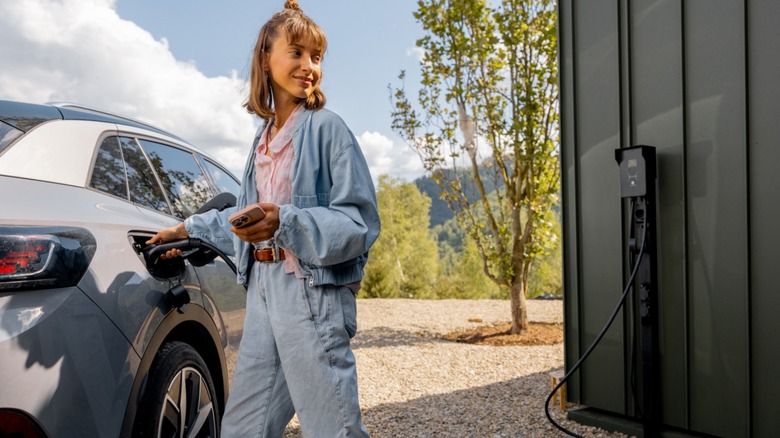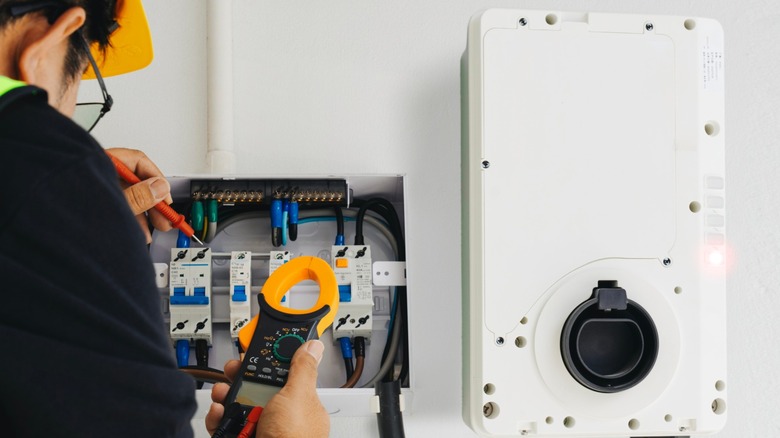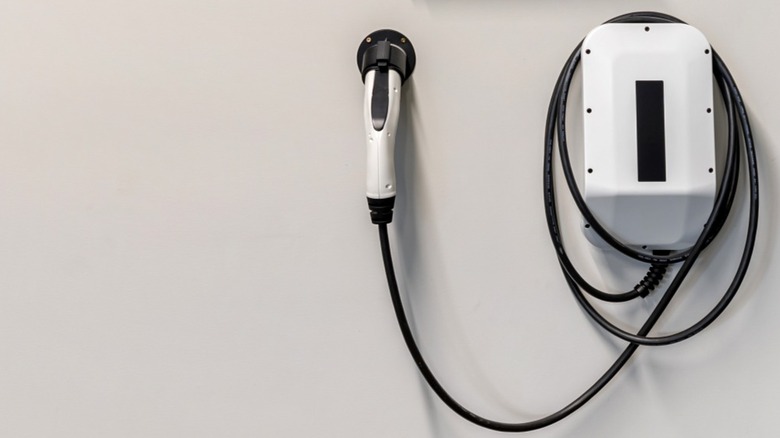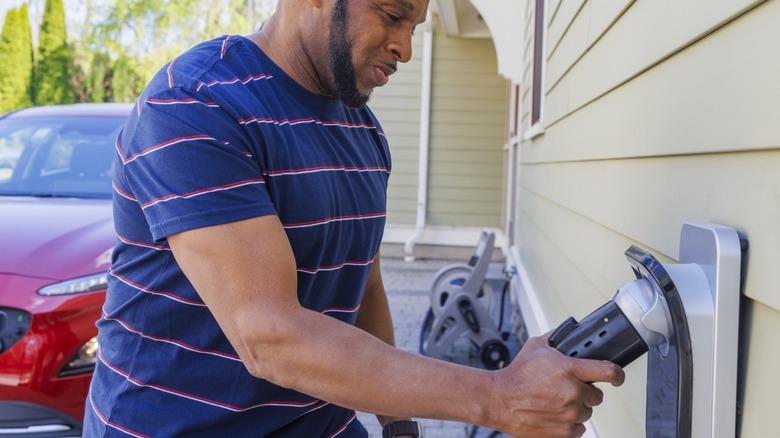
Maybe you've just bought your first EV and you're excited to get a home charger to complete the purchase, or you're a seasoned EV owner who's tired of either hunting for charging spots or spending a part
of every Saturday morning sitting in your car, plugged into a public charger. (It's the kind of thing that could keep you from buying an EV in the first place.) In either case, you've probably heard that Costco, like most big box stores, sells home EV chargers. But the truth is, while Costco does sell EV chargers, your options are limited and the choices — while suitable for the needs of the typical driver — are not top of the line.
We found three home EV chargers listed on Costco's website: the Wallbox Pulsar Plus Lv 2 EV Smart Charger, the Battery Tender 40-amp EV Charger, and the Battery Tender 32 Amp Portable EV Charger. The first two are more-powerful Level 2 chargers that top out at 40 amps. Both can be plugged into a suitable 240-volt NEMA 14-50 outlet (the kind used for dryers), but the Battery Tender 40-amp also includes the option to hardwire it.
The third charger in the list, the Battery Tender 32 Amp Portable EV Charger, can be a 32-amp Level 2 charger when plugged into a 240-volt outlet, or a portable, less powerful Level 1 16-amp charger that can plug into most 120-volt household outlets. Most places require you to hire a licensed electrician when you install a 240-volt outlet in your home, so check your local laws.
Read more: Everrati's Electric Porsche 911 RSR Has Me Driving Into The Future With Open Arms
Is 40 Amps A Lot?

If you've done any research on EV chargers, you've come across references to amperage, voltage, and kilowatt-hours, as well as phrases like "Level 2 charging." That can be confusing unless you're an electrician. But what it all boils down to is how fast you need to charge your car.
There are two levels to home charging, creatively named "Level 1" and "Level 2." A Level 1 charger usually requires no installation and can be plugged into a regular 120-volt household outlet. Level 2 requires a 240-volt, four-hole "NEMA 14-50" outlet — genarally installed by an electrician — as well as a dedicated circuit breaker. There is a third level of charging, called "DC Fast Charging", but this level is for public charging stations (the lack of which is a common problem) and is not practical for home use.
The reason EV owners install Level 2 chargers is the difference in charging times, which is stark. Thanks to its higher amperage and kilowatt output, a Level 2 charger can give your car 10 to 20 miles of range per hour of charging, taking 4 to 10 hours to charge the battery from empty to full. A Level 1 charger can provide 2 to 5 miles per hour of charging, taking up to 50 hours to fully charge your battery.
So the 40-amp chargers at Costco will charge your car faster than the 32-amp model. But 40 amps is not the highest rating for home chargers, as many can charge at 48 amps or higher. The difference in charge times is significant but not dramatic. A 40-amp charger outputs around 9.6 kilowatts, compared to a 48-amp charger that can output around 11. That translates to an hour or so shorter charging time for the typical EV.
Hardwired Or Plugged In?

You have two options when installing a Level 2 charger in your home — hardwired or plugged in. While all three Costco chargers can be plugged in, the Battery Tender 40-amp can also be hardwired. Which option is better? Partly, it depends on the amperage and how fast you want to charge your car. The Costco chargers max out at 40 amps. If you want a charger rated at 48 amps or higher, you'll have to get one that's hardwired.
Then there's the relative difficulty of installation. If your house already has a 240-volt NEMA 14-50 outlet that can handle the continuous high-voltage charge, all you need to do is plug the charger in. Installing hardwired chargers, on the other hand, requires a licensed electrician and inspection in nearly every locality.
Does that mean if you buy a plug-in unit and already have a dryer outlet, you don't need an electrician? Well, is the outlet properly grounded, and can it take a continuous high-voltage charge without melting (many can't)? Does your current electrical panel have the ampacity to handle the electric current needed for your charger? If you don't feel qualified to answer these questions, you definitely need to call an electrician.
There's not much difference in the cost of the two types of units. The highest price listed on the Costco site is around $450. We've found hardwired alternatives for around $400, and others that cost around $600. But you have to factor in the cost of installation, too. Installing a hardwired EV charger can actually be cheaper ($850 to $1,800) than installing a plug-in that needs a new outlet ($1,000 to $2,200).
Should You Choose A Faster Charger?

So should you skip the Costco models and opt for a hardwired 48-amp EV charger? It depends on your needs. Most EV drivers should get by fine on a 40-amp model. Most drivers don't actually need fast charging, because they don't use anywhere near a full charge in the course of a day. Even if you're a road warrior who would use close to a full charge in a day, both the 40-amp and 48-amp chargers can fully charge a battery overnight.
But let's say you want to shave that extra hour off your charging time. What EV chargers are out there besides the Costco models? Well, you might check out the ChargePoint HomeFlex Level 2 EV Charger, adjustable from 16 to 50 amps, or the 48-amp EVIQO Level 2 EV Charger. Both are hardwired, and are highly rated on Amazon.
Before you decide whether to dust off your Costco membership card, figure out what kind of home EV charger is best for you. Take into account how many miles you drive, how much time you have to charge, what your home's electrical system can handle, and how fast your EV can charge from a home charger (many top out at 48 amps). That way, you'll be able to make an informed decision.
Want more like this? Join the Jalopnik newsletter to get the latest auto news sent straight to your inbox...
Read the original article on Jalopnik.










